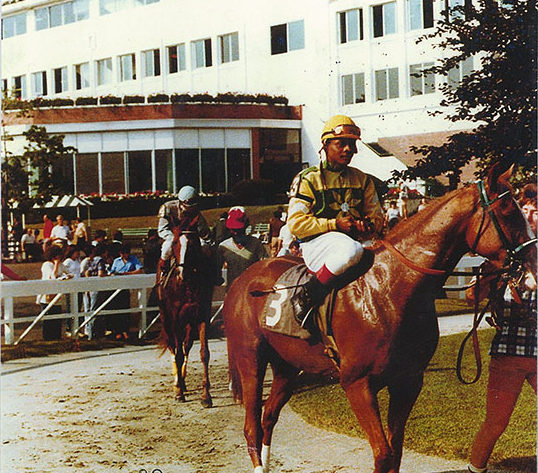By Laura D.C. Kolnoski
RED BANK – Fulfilling its commitment to spread knowledge and understanding through education and outreach, the borough’s new T. Thomas Fortune Cultural Center on Drs. James Parker Boulevard is diving deep into a myriad of timely topics.
Opened in May, the center, occupying the restored one-time home of an early civil rights crusader and journalist, offers a packed calendar of music programs, a book club, tours and engaging events for all ages.
Particularly resonating with audiences is “Racing for Freedom,” a short video about three men who worked in the horse racing industry in Monmouth County. First shown at the center for “Juneteenth” commemorating the June 19, 1865 announcement of the abolition of slavery in the United States, the video will be screened again soon as part of a larger project.
“The T. Thomas Fortune Foundation received a grant from the Monmouth County Historical Commission to do oral histories and we collected ephemera from Red Bank residents to tell a story about African Americans who owned businesses, were involved in civic organizations, et cetera,” said Gilda Rogers, vice president of the T. Thomas Fortune Foundation. “In late fall we will bring those stories to life as we work on the decor of the Drs. James Parker Community Room upstairs at the Cultural Center, where this information and visuals will be on display.”
The film also connects African Americans in the equine industry with Fortune. As the editor of The New York Age, Fortune chronicled Isaac Burns Murphy, known as the “Crown Prince of Jockeys” who was born into slavery in 1861 and became the wealthiest athlete of his time, winning the Kentucky Derby three times.
The onscreen trio in “Racing for Freedom” includes Ronald Tanner, an award-winning jockey, clocker Gatha “Gates” Artis and track worker Rodney Noel, who during his career chauffeured baseball great Jackie Robinson and entertainment luminaries and was the first black teller at Monmouth Park.
Encouraged by his uncles who thought he had the makings of a jockey, Tanner went to the New York Racing Association school on a black-owned horse farm and got a job training horses at Belmont Park for the Vanderbilt family. That led to Saratoga, where he met and became employed by the DuPonts. Originally from Pittsburgh and currently residing in Long Branch, Tanner’s first encounter with racial prejudice and Jim Crow laws was in 1963 at Pimlico Racetrack in Maryland, where accommodations were separate for blacks and whites.
“It was a rude awakening,” Tanner said. “In Tennessee, we couldn’t get off the van to go into a restaurant. A white guy had to get our food. At the fairgrounds, the cafeteria was split into white and black.”

According to Equibase.com, an equine industry data site, Tanner’s career earnings totaled $853,594 in 1,261 starts. He came in first 123 times, second 125 times, and third 122 times.
Racing from 1976 through 1996, Tanner’s best year was 1978, when his wins reached $400,000.
With over 30 years in horse racing, mostly at Monmouth Park, Artis, a Philadelphia native, studied, analyzed and timed racehorses with a knack for spotting winners. Representing thoroughbred buyers at horse sales, his clients included basketball great Bob Hurley and Japanese buyers.
“I wanted to escape the violence in Philly,” Artis tells interviewer Karen Brittingham-Edmond on the video. “At 16, I took a trip to the country and decided there was something better.” In addition to legions following his data in the Daily Racing Form, Artis is credited with moving stats from pencil and paper to computer. Despite skepticism among racetrack denizens, he got started entering data on a portable Macintosh Plus.
“It was my highlight in the industry,” said Artis, who in the video discusses how by the 1970s, the equine industry became a place African Americans could find success.
“People were starting to notice blacks, including horse owners, were doing well,” Artis recalled. “Others in the industry began raising non-specific charges and used them to ban blacks from the track for months, years or life.” The men noted that track jobs that were once exclusively held by blacks are now largely filled by Hispanics.
Lincroft resident Karen Brittingham-Edmond, who studies the area’s black history, discovered through her family’s historians that her enslaved ancestors once inhabited the area. Additionally, her great-grandfather, born a slave, became a popular and successful harness racer in Maryland and Delaware. Another branch of her family tree raised thoroughbred horses. While studying psychology and political science at Brookdale Community College, Brittingham-Edmond took a job at Monmouth Park.
“My professors instructed me how to reach out to local leaders such as Monmouth University’s professor of anthropology Gerry Scharfenberger, former mayor of Middletown,” (now a Monmouth County Freeholder), Brittingham-Edmond said. “Being able to work at Monmouth Racetrack afforded me the ability to see the rich history of artwork throughout the centuries that depicted black men as trainers, owners, jockeys and valets.”
Former Monmouth Park president Bob Kulina and current vice president Bill Knauf suggested she interview Tanner, Artis and Noel. “Their personal stories inspired me to reach out to Ms. Rogers regarding creating a series of documentaries that would share the ongoing experience of black folks in the horse racing industry,” she added.
“Karen made us aware of the story and its connection to the African American community dating back to slavery,” Rogers said. “The T. Thomas Fortune Foundation paid videographer Steve Rogers to shoot the video through the oral history grant we received.”
The video was filmed in the History Room at the Red Bank Public Library on Front Street prior to the T. Thomas Fortune Cultural Center’s opening. Rogers said “Racing for Freedom” will also be shown during February’s Black History Month. Brittingham-Edmond is continuing to chronicle Monmouth County’s African American history.
“These stories will be full of mystery, excitement, truth-telling, and fun thanks to the T. Thomas Fortune Cultural Center,” she wrote in an email. “I’m happy that Gilda Rogers and the board members, plus friends of the TTF Cultural Center thought I had a good idea.”
For more information on the center, its programs and events, visit tthomasfortuneculturalcenter.org.














